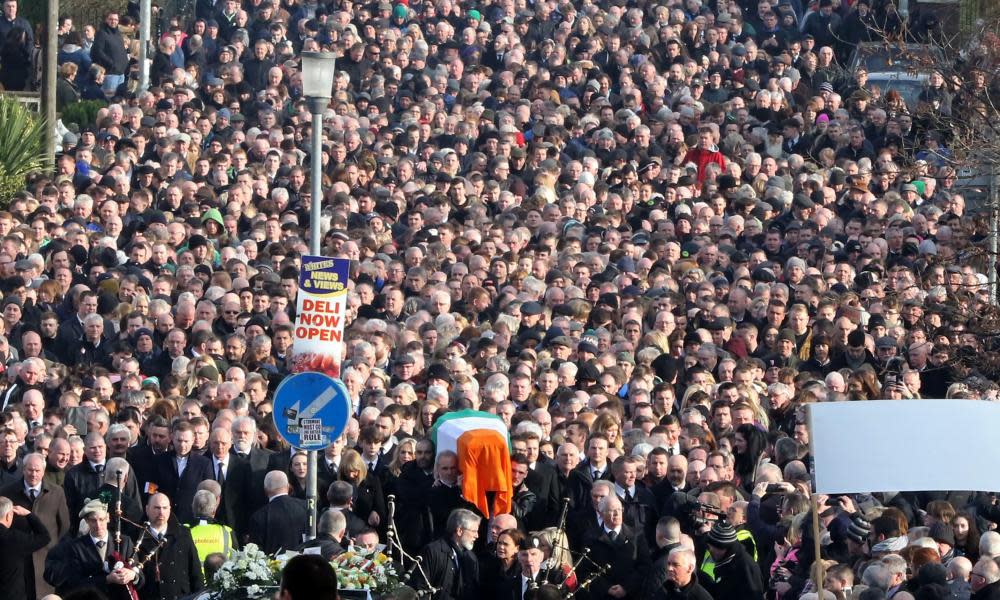Martin McGuinness: 'We knew he was for us and would never let us down'

As the pallbearers carried the tricolour-draped coffin to the end of the street where Martin McGuinness lived, and turned left onto the hill that would take him down to the heart of the Bogside, one man standing at the corner began to clap.
Then another, and another, and within a second or two, thousands of people were applauding. As the cortege made its way down to Free Derry Corner, the salute was taken up by tens of thousands more. It was a simple gesture of respect and thanks.
Shops were closed, businesses shuttered and classrooms had been emptied so that the people could mark the passing of their Fior-Taoiseach: a true chieftain.
Less than half a mile away in The Fountain, the tiny Protestant and loyalist enclave that clings to the southern corner of the old city walls, and across the River Foyle in parts of the Waterside district, people were going quietly about their business. They were reluctant to express their views about the Republican leader, but they were certainly not in mourning.
McGuinness was born into and came to dominate this complex city; one that is so divided by faith, national identity and history that it cannot even agree its own name. Is it Derry, from the Irish for oak grove; or Londonderry, in respect for the role that the London guilds played in helping to found it?
Some official bodies call it Derry/Londonderry, and a few people pronounce it that way: “Derry-stroke-Londonderry”. For the wags, of course, it is now Stroke City.
For much of his life, McGuinness had no time for such compromises. He led those inhabitants of the city who believed that defiance and resistance were the only possible response to institutional discrimination and state violence.
The men and women he led – and their families and communities – clearly loved and trusted him. “You had to have lived in Derry through the Troubles to understand why we revered him,” said Mary, one of the thousands lining Westland Street in the Bogside as the coffin was carried past. “We knew he was for us and he would never let us down, it’s that simple.”
Her friend Maeve added that “he was a good husband and father”, a man of simple tastes and a regular churchgoer, all qualities that would carry him far in that part of the world.
Jack and his father, Liam, a farmer, who had travelled up from Galway, said they wanted, as “members of the Republican family”, to pay their respects to a great Irishman. Ciaran, who had come all the way from West Cork, said he wanted to be present at a moment in his country’s history.
However, there were some among the mourners who said, quietly, that they would never forget the devastation wrought by the “economic war” that the IRA waged under McGuinness’s leadership in the 70s. It had left their city looking as though it had been visited night after night by the Luftwaffe.
There was also recognition that McGuinness, while fearless, had also been ruthless. One former volunteer in the secret army who was among the crowd confided that “nobody who was in the IRA agreed with everything the IRA did”. He did not single out any particular deed.
Over in The Fountain, people were a little less reticent. One older man – “No, I’m not giving you my first name, I have to live here” – spoke of the assassinations of part-time members of the security forces. “I lost many friends, all decent people – working class people – who joined the UDR [Ulster Defence Regiment] or police reserve. McGuinness signed their death warrants. You’ll find a lot of sore hearts around here and we’re not ready to forgive and forget.”
One of his neighbours, a woman who lived in the area throughout the Troubles, looked distressed as she spoke of the IRA’s use of so-called proxy bombs, strapping men into cars beside an explosive device. “And now they’re comparing him to Nelson Mandela? Nelson Mandela spent a very long time in jail – he didn’t.”
But it was the last chapter of the life of McGuinness that won over many people of both communities in Stroke City. At a bookshop in the Waterside, Brian, a Protestant from the Republic, living in a loyalist community in the city, said the life of McGuinness had been a life of two halves.
People in Londonderry and beyond should remember the positive way in which McGuinness attempted to forge a new future, he said, one of peace and reconciliation for the north of Ireland. “Some people may have mixed emotions, but we cannot allow bitterness about the past to take root.”
At St Columba’s Church, that was the message that many wanted to convey before the funeral began, when Arlene Foster, the former first minister and leader of the Democratic Unionists, arrived to take her place.
First one person clapped, and then another, and then all of the mourners applauded: another simple gesture of respect and thanks.

 Yahoo News
Yahoo News 
